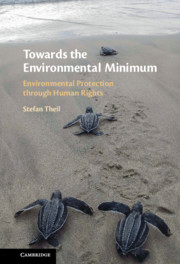Book contents
- Towards the Environmental Minimum
- Towards the Environmental Minimum
- Copyright page
- Dedication
- Contents
- Figures
- Acknowledgements
- Abbreviations
- 1 Introduction
- Part I Introducing the Environmental Minimum
- Part II The Environmental Minimum under the ECHR
- 4 Specific Risk Principle
- 5 Reasonable Hypothesis
- 6 Minimum Standards
- 7 High Priority
- Part III Beyond the European Convention
- Part IV Beyond Human Rights Law
- Appendix: Data Methodology
- Bibliography
- Index
6 - Minimum Standards
from Part II - The Environmental Minimum under the ECHR
Published online by Cambridge University Press: 27 August 2021
- Towards the Environmental Minimum
- Towards the Environmental Minimum
- Copyright page
- Dedication
- Contents
- Figures
- Acknowledgements
- Abbreviations
- 1 Introduction
- Part I Introducing the Environmental Minimum
- Part II The Environmental Minimum under the ECHR
- 4 Specific Risk Principle
- 5 Reasonable Hypothesis
- 6 Minimum Standards
- 7 High Priority
- Part III Beyond the European Convention
- Part IV Beyond Human Rights Law
- Appendix: Data Methodology
- Bibliography
- Index
Summary
The chapter explores the ECHR approach to the minimum standards of the environmental minimum. These standards apply once a specific risk has been established and are derived either from domestic and international legal norms, or in lieu of these, established and emerging scientific evidence. Notably, unclear or contradictory scientific evidence grants states a wide margin of appreciation in formulating a regulatory response. Should a violation of minimum standards be established, individuals have a claim based on the right invoked at the specific risk stage. The question for the ECHR case law is whether it requires the enforcement of legal norms, and mandates subsidiary recourse to established and emerging scientific evidence in their absence. The ECHR generally meets these requirements: a clear majority of cases where domestic environmental regulations were ignored by authorities also resulted in a violation of the ECHR. However, the chapter acknowledges some enduring concerns, notably the failure of the Court to invariabley find violations where states fail to consistently enforce domestic law and its deferential approach in some cases where a state had no legal norms to enforce.
Keywords
- Type
- Chapter
- Information
- Towards the Environmental MinimumEnvironmental Protection through Human Rights, pp. 169 - 183Publisher: Cambridge University PressPrint publication year: 2021

